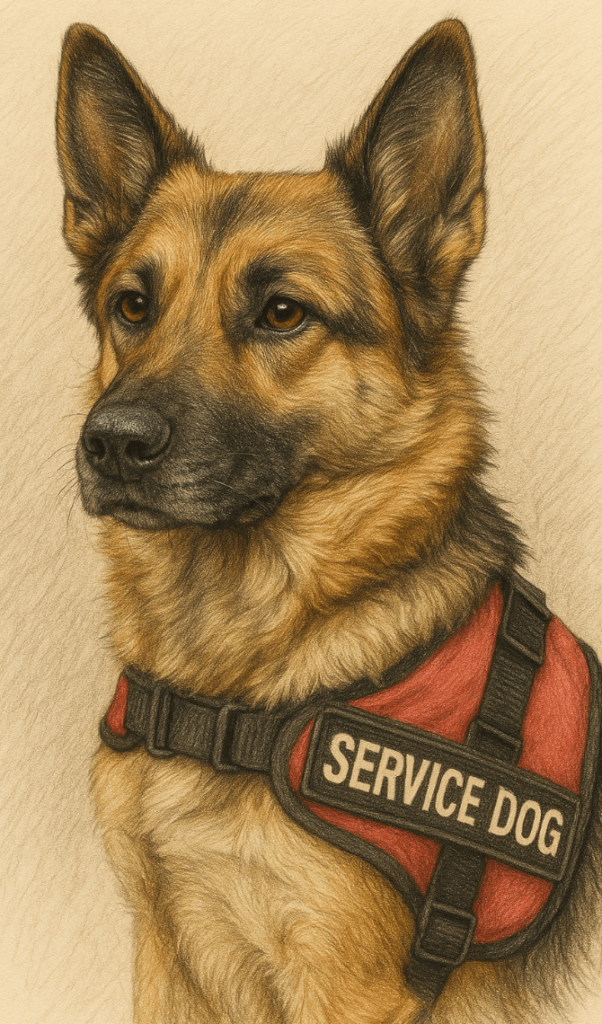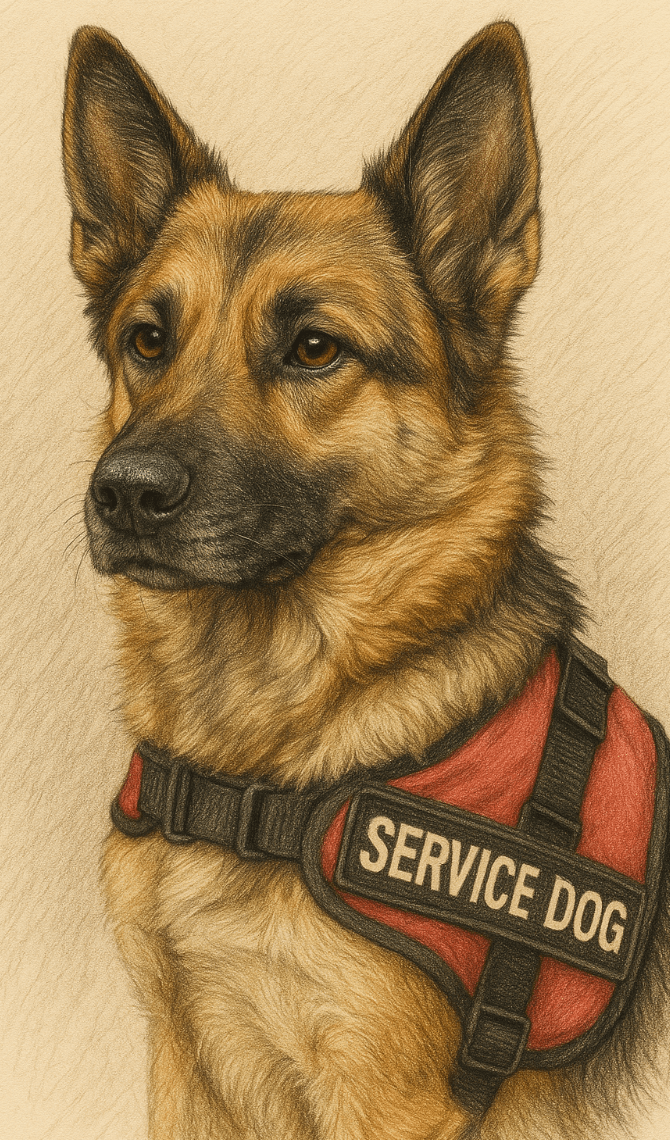Bipolar Service Dog: A Lifeline for Emotional Stability
Living with bipolar disorder can be challenging, but service dogs are proving to be invaluable companions in managing the condition. These highly trained animals provide emotional support, detect mood shifts, and help their handlers navigate the complexities of bipolar disorder. Unlike regular pets, bipolar service dogs are specially trained to perform tasks that directly assist individuals in maintaining stability and independence.
In this blog post, we’ll explore how these remarkable dogs make a difference, the training process involved, and the benefits they bring to those living with bipolar disorder. Whether you’re considering a service dog or simply curious about their role, this guide will provide insight into their life-changing impact.
How Bipolar Service Dogs Assist Their Handlers
Bipolar service dogs are trained to perform specific tasks tailored to the needs of individuals with bipolar disorder. Their abilities go beyond simple companionship, offering practical support during both manic and depressive episodes. Here’s how they help:
Mood Shift Detection:
These dogs are trained to recognize subtle changes in behavior or scent that indicate an impending mood shift, allowing handlers to prepare or seek help.Interrupting Harmful Behaviors:
During manic episodes, a service dog may nudge or distract their handler from engaging in impulsive or risky actions.Providing Grounding Techniques:
In moments of anxiety or dissociation, the dog can apply gentle pressure or stay close to help the handler feel grounded and calm.Medication Reminders:
Service dogs can alert their handlers when it’s time to take medication, ensuring consistent treatment adherence.Assisting During Depressive Episodes:
By encouraging movement or providing comfort, these dogs help combat the lethargy and isolation often associated with depression.
With their unique skills, bipolar service dogs empower individuals to manage their symptoms more effectively and regain a sense of control over their lives.
Training Process for Bipolar Service Dogs
The journey to becoming a bipolar service dog is rigorous and requires extensive training to ensure the animal can meet the demands of their role. This process involves several key stages.
Basic Obedience Training:
All service dogs begin with foundational commands like “sit,” “stay,” and “heel” to establish discipline and responsiveness.Task-Specific Training:
Dogs learn specialized tasks such as detecting mood changes, interrupting harmful behaviors, and providing tactile stimulation during distress.Public Access Training:
Service dogs must remain calm and focused in various environments, including crowded spaces, to ensure they can accompany their handler anywhere.Bonding with the Handler:
Building a strong relationship between the dog and their handler is crucial for effective communication and teamwork.Ongoing Skill Reinforcement:
Even after certification, regular practice and reinforcement are necessary to maintain the dog’s skills and adapt to the handler’s evolving needs.
This comprehensive training ensures that bipolar service dogs are equipped to provide reliable support in real-world situations.
Check this guide 👉Mobility Service Dog Training: Best 7 Expert Tips!
Check this guide 👉Service Dog for Depression: Best 7 Expert Tips!
Check this guide 👉Autism Service Dog Training: Best 7 Expert Tips!

Benefits of Bipolar Service Dogs | Challenges of Owning a Service Dog |
|---|---|
Early detection of mood shifts | High cost of acquiring/training |
Reduced feelings of isolation | Time-intensive care and maintenance |
Improved medication adherence | Public access disputes or stigma |
Enhanced emotional stability | Limited personal freedom (constant care) |
Increased independence | Potential behavioral issues in dogs |
Qualities That Make a Great Bipolar Service Dog
Not all dogs are suited to become bipolar service dogs. Certain traits and characteristics are essential for success in this demanding role.
Temperament:
Calm, patient, and non-reactive dogs are ideal for handling the unpredictable nature of bipolar disorder.Intelligence:
Quick learners with problem-solving skills excel in mastering complex tasks required for service work.Trainability:
A willingness to follow commands and adapt to new situations is critical for effective training.Size and Strength:
Medium to large breeds are often preferred for tasks like applying deep pressure therapy.Health and Longevity:
Dogs should be free of genetic health issues to ensure they can serve their handler for many years.
Selecting a dog with these qualities lays the foundation for a successful partnership between the handler and their service dog.
Legal Rights and Protections for Bipolar Service Dogs
Individuals with bipolar service dogs are afforded certain legal rights under disability laws. Understanding these protections is vital for navigating public spaces confidently.
Americans with Disabilities Act (ADA):
The ADA grants service dogs access to most public areas, including restaurants, stores, and transportation.Identification Requirements:
While no formal ID is legally required, handlers may carry documentation to clarify their dog’s role if questioned.Housing Protections:
Under the Fair Housing Act, landlords must allow service dogs even in “no-pet” properties without charging extra fees.Air Travel Regulations:
Although rules vary, service dogs are generally permitted to accompany their handlers on flights within the U.S.Public Etiquette Expectations:
Handlers are responsible for ensuring their dog behaves appropriately in public settings to avoid disruptions.
Knowing your rights helps ensure that you and your service dog can navigate daily life without unnecessary barriers.
Signs Your Dog Could Be a Good Candidate for Service Work
If you’re considering training your pet as a bipolar service dog, look for these signs that indicate they might excel in this role.
Calm Demeanor:
Dogs who remain relaxed in chaotic environments are better suited for public access work.Strong Focus on Their Handler:
A dog that pays close attention to their human is easier to train for task-specific duties.Desire to Please:
Eager-to-please dogs tend to respond well to training and enjoy performing tasks.Adaptability:
Dogs comfortable in new or changing situations adapt quickly to the unpredictability of service work.Affectionate Nature:
A loving disposition fosters a strong bond, which is essential for effective teamwork.
Recognizing these traits can help determine whether your dog has the potential to thrive as a service animal.
Tips for Caring for Your Bipolar Service Dog
Owning a bipolar service dog requires commitment to their physical and emotional well-being. Follow these tips to ensure your dog stays healthy and happy.
Regular Veterinary Checkups:
Schedule routine vet visits to monitor your dog’s health and address any issues promptly.Balanced Diet and Exercise:
Provide nutritious food and daily exercise to keep your dog physically fit and mentally stimulated.Mental Stimulation:
Incorporate puzzle toys or obedience practice to prevent boredom and reinforce training.Adequate Rest:
Ensure your dog gets enough downtime to recharge, especially after busy days.Positive Reinforcement:
Reward good behavior consistently to strengthen your bond and maintain motivation.
By prioritizing your dog’s care, you ensure they remain a reliable partner in managing bipolar disorder.
How to Advocate for Your Bipolar Service Dog in Public
Despite legal protections, handlers sometimes face resistance when bringing their service dog into public spaces. Here’s how to handle such situations effectively.
Stay Calm and Polite:
Approach interactions courteously, even if others are confrontational, to de-escalate tension.Know Your Rights:
Familiarize yourself with local laws and confidently explain your dog’s role if questioned.Carry Documentation (Optional):
While not required, carrying a card or vest identifying your dog as a service animal can reduce misunderstandings.Educate Others:
Use encounters as opportunities to inform people about the importance of service dogs for mental health.Report Discrimination:
If denied access unlawfully, document the incident and file a complaint with relevant authorities.
By advocating respectfully and knowledgeably, you can pave the way for greater acceptance of service dogs in society.
Frequently Asked Questions About Bipolar Service Dogs
What qualifies a dog as a bipolar service dog?
A bipolar service dog must be individually trained to perform tasks that mitigate the effects of bipolar disorder.
Can any breed become a bipolar service dog?
While any breed can potentially qualify, certain breeds like Golden Retrievers and Labradors are commonly chosen due to their temperament and trainability.
How much does it cost to get a bipolar service dog?
Costs range from $10,000 to $50,000, depending on the organization and level of training provided.
Do I need a doctor’s note to have a service dog?
While not legally required, a letter from a healthcare provider can help validate your need for a service dog.
Can I train my own bipolar service dog?
Yes, individuals have the right to self-train their service dog, though professional guidance is often recommended.
Transformative Support Through Bipolar Service Dogs
For individuals living with bipolar disorder, a bipolar service dog can be a lifeline, offering unwavering support and companionship. From detecting mood shifts to assisting with daily tasks, these incredible animals play a vital role in improving mental health outcomes and fostering independence. While the journey to obtaining and caring for a service dog comes with challenges, the rewards far outweigh the effort. With proper training, understanding, and advocacy, bipolar service dogs can transform lives, one paw at a time.
Do Cats Have Taste Buds? Best 7 Expert Tips! – Discover how cats experience flavors and why their taste is so unique.
Do Dogs Have Taste Buds? Best 7 Expert Tips! – Discover how dogs experience taste, their preferences, and what it means for their diet and health.
Can Cats Taste Sweet? Best 7 Expert Tips! – Discover why cats can’t taste sweetness, how it affects their diet, and tips to keep them healthy and happy.
Can Dogs Taste Sweet? Best 7 Expert Tips! – Discover how dogs perceive sweetness, which foods are safe, and tips to manage their sweet cravings responsibly.





